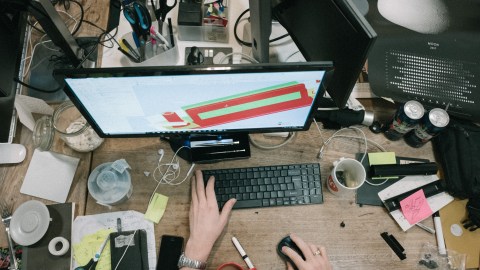No, you don’t need to be a hoarder to have a clutter problem

When it comes to clutter, it doesn’t take anywhere next to hoarder-level accumulation to experience the unwanted side-effects of excess stuff.
Maybe you avoid cooking healthy meals when your kitchen is in chaos. Or perhaps your sleep suffers when a mild tsunami hits your bedroom. And keeping work stress in check when your office cubicle is out of control? Not gonna happen.
Since clutter and stress go hand-in-hand, getting a handle on those exploding closets and overstuffed drawers is well worth the effort. And experts say the best defense against the mess is understanding what’s behind it.
But the truth is, everyone’s reason for clutter is different. Sometimes the explanation is purely practical — and a trip to the Container Store for new storage is an easy fix. Other times, however, something deeper is at play, and takes a little more self-reflection to uncover. “If you’re feeling really stuck, try journaling about what your issue might be,” says Susan Biali Haas, M.D, an expert in stress management.
Here are three not-so-obvious reasons for what experts call “toxic accumulation.” Once you understand the cause of your clutter, you’ll be able to tame the beast and feel calmer and more productive.
You’re avoiding certain emotions or experiences
Sometimes those piles we create are literally a wall we build to block out certain experiences or feelings. And as clinical psychologist Noah Mankowski told Motherly, where we store our clutter may provide clues into exactly what we’re trying to avoid. For example, Mankowski says keeping clutter in your attic or basement might mean you have trouble moving on from the past, while a bedroom in disarray might suggest fears of intimacy.
You have decision fatigue
By some estimates, the average American makes 35,000 decisions a day. No wonder you may not want to choose which items on your desk or in your garage you should part with to begin to make a dent in the clutter. “People are often so drained from decision-making that they don’t have the energy for little decisions about what they should keep and throw out,” Alice Boyes, Ph.D., a clinical psychologist, tells Thrive.
You’re a bit lonely
Think back to the last time you impulsively purchased something: Did you fork over your credit card because you really thought that new shiny object would improve some facet of your life, or were you feeling a bit sad, and looking for a quick salve? Research in the Journal of Consumer Research explains that when our need for social connection isn’t met, “material substitutes and compensations are often readily available, immediately rewarding, and less anxiety provoking than attempts to reconnect.” Translation: “Retail therapy” can become and all-too-easy fix for loneliness, and indulging it in too often may lead to excess stuff — and clutter.
The bottom line on clutter
While it takes effort to get to the root cause of clutter, a calmer and more joyful life is on the other side of the mess. And tackling clutter doesn’t have to be an overwhelming endeavor. One way to make it more manageable? Try habit stacking, or creating a new habit on top of an existing one. A habit like brushing your teeth can become an opportunity to scan your bathroom for items that need to be properly stored or thrown away. And your morning ritual of washing the breakfast dishes can become a chance to toss one item — say, a nonstick pan that has seen better days, a chipped plate — that will help you get a handle on kitchen mayhem. Baby steps… with a big payoff.
Reprinted with permission of Thrive Global. Read the original article.





